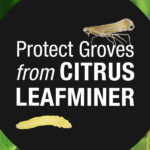Tackle Early-Season Peanut Disease
Diseases like Rhizoctonia, Fusarium, Pythium, and more can negatively impact your peanut crops. Learn how to identify and prevent these diseases in your crops.

No matter what weather conditions each season brings, you can count on peanut diseases to make an appearance in the Southeast. Cool, wet conditions early in the season increase the risk for seedling diseases like Pythium, Rhizoctonia, and Fusarium, whereas excessive heat or fluctuations in soil moisture during the seedling development stage creates favorable conditions for outbreaks of Aspergillus crown rot. These early-season diseases can impact plant health and cause problems throughout the growing season and into harvest, including reduced yield potential and decreased shelling grade.
Be Proactive
Prioritizing proactive disease management in your annual plans is critical to manage the cycle of early-season diseases. Disease and nematode management is one of the most important aspects of peanut production in the southeastern U.S.
The Peanut Rx program is a valuable resource that can inform your decisions this year. This tool provides insight into risk factors, including variety, planting date and plant population, to help you understand which diseases to expect and plan accordingly.
Mitigating diseases with a preventive approach will help you come out on top and allow your seeds to achieve their full yield potential.
Start Strong with Seed Treatments
Fungicide seed treatments give you an advantage at the start of the season and act as an insurance policy against impending diseases. Starting the season with a proven seed treatment is the best way to protect vulnerable seedlings from a variety of pests. We recommend Trebuset® Peanuts fungicide seed treatment, a liquid fungicide premix that provides benefits over traditional dust seed treatments.
Trebuset Peanuts combines the best chemistries to bring seed quality and early-season disease management to the next level. With five active ingredients, Trebuset Peanuts stays on the seed to defend against key early-season diseases while also helping protect developing roots, deliver strong stands and support higher yield potential.
A 2020 study in Georgia showed that stressed seeds treated with Trebuset Peanuts had nearly 3,250 more plants per acre than untreated peanuts, demonstrating seed treatments’ value in fighting difficult diseases like Aspergillus crown rot and post-emergence damping off.
For more information about early-season peanut diseases and solutions, reach out to your local Syngenta representative.
2 Min Read
- Peanut diseases pose a consistent challenge to growers in the Southeast.
- Disease and nematode management is one of the most important aspects of peanut production.
- Fungicide seed treatments support seedling health at the start of the season and help protect against impending diseases.























